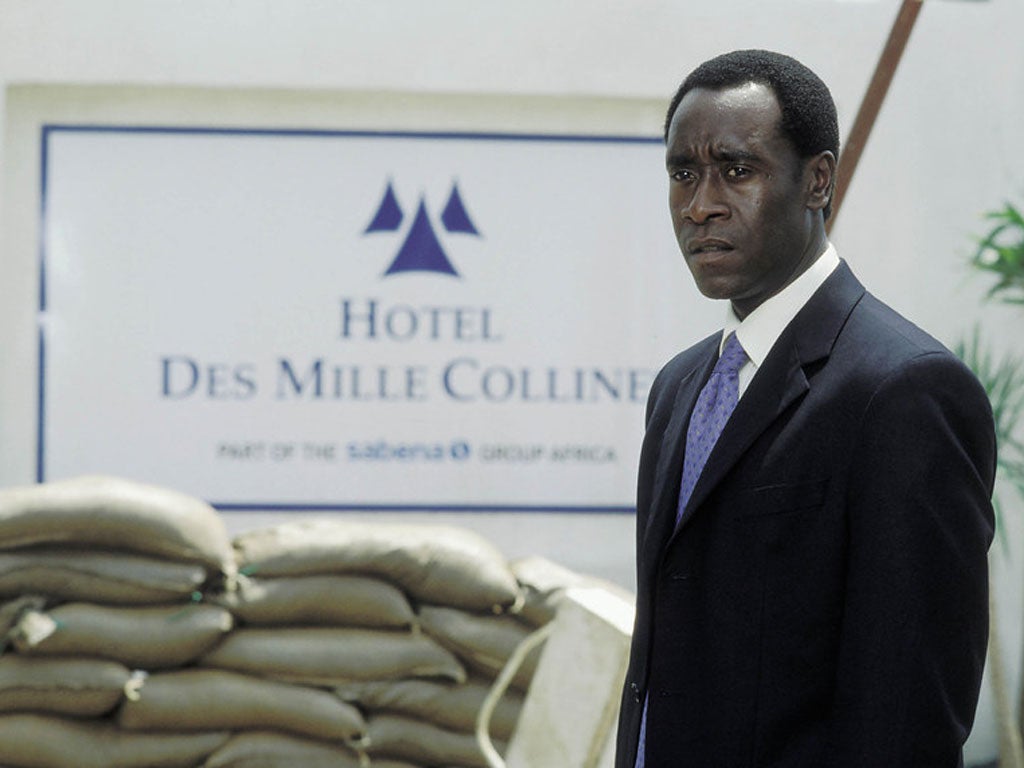Famous hotels: Soft beds and hard battles
From Belfast during the Troubles to Rwanda in the middle of a genocide, Jonathan Brown checks out hotels that became famous during periods of conflict

It's not just as a bolthole for reporters that hotels have played famous parts in wars. As Matthew Sweet's new book West End Front recalls, London hotels such as The Ritz and The Savoy were key destinations for spies and fallen governments during the Second World War. But others around the world have played even more famous roles in conflicts:
Rex Hotel, Ho Chi Minh City (formerly Saigon)
Although they were dismissed by the cynical, battle-hardened press corps that covered the US war in Vietnam as the "five o'clock follies" – the daily military press briefings held in the rooftop garden of the French-built, colonial-era hotel provided unmissable drama.
Summoned each evening at the cocktail hour, reporters and military top brass would come face to face in bad-tempered exchanges. For Barry Zorthian, the superpower's propagandist-in-chief, the task was to put the best possible spin on the mounting body count. Journalists saw it as their mission to break down what they saw as Uncle Sam's lies and obfuscation in what was described as "the longest-playing tragi-comedy in South-east Asia's theatre of the absurd". Today the Rex is popular with business travellers while the rooftop bar provides a kitschy watering hole for those on 1960s nostalgia trips.
Can you still stay there? Yes.
Rooms starting from $200 (£130)
Europa Hotel, Belfast
When work began on the site of the former Great Northern Railway station in the early 1970s, the Europa and its 12 glass-fronted stories were supposed to herald a sophisticated, cosmopolitan future for Belfast. But by the 1980s the Europa had the notoriety of being the most bombed hostelry in Europe, if not the world. Known as the Hardboard Hotel because it was perpetually under repair, it was struck 33 times between 1970 and 1994 by the IRA.
It only shut twice – becoming a trenchant symbol of the province's determination at the height of the Troubles.
Although general manager Harper Brown was said to be on an IRA death list he persistently defied the bombers, on one occasion picking up and removing a device to the hotel car park to see it brought straight back in again – requiring him to take it back outside.
And while for most of its inhabitants Belfast city centre was under virtual night-time curfew, the fun at the Europa continued unabashed with journalists enjoying the delights of the Penthouse Poppets – a less risqué version of the Playboy bunnies who dressed in high-cut one-pieces and served drinks.
Can you still stay there? Yes.
hastingshotels.com/europa-belfast
From £120
Hotel des Mille Collines, Kigali
Paul Rusesabagina was manager of the Diplomate Hotel in Kigali when the genocidal slaughter of Rwanda's Tutsi population began in 1994.
As an ethnic Hutu he was safe but his wife Tatiana was not and their children weren't either. Like many others in the city, the family sought shelter in the Belgian state-airline owned Hotel des Mille Collines. Meanwhile, the rest of the world sat on its hands as the murderous militias did their worst.
Armed with nothing more than a letter from his employers appointing him acting manager, Rusesabagina helped shelter 1,268 Tutsis and moderate Hutus from the Interahamwe – a humanitarian feat that saw him labelled Africa's Oskar Schindler. The 100 days that he held out at the four-star hotel where "guests" were forced to drink the swimming pool water were immortalised in the Oscar-nominated film Hotel Rwanda. At the height of the violence he sent his family away to safety while he stayed behind to safeguard the refugees.
Can you still stay there? Yes.
See millecollines.net for prices
Hotel Florida, Madrid
It may have been nearly a year into Europe's most brutal civil war but the atmosphere inside the Hotel Florida in spring 1937 owed more to the Boulevard du Montparnasse than the atrocities being visited on Spain.
Inside the elegant marble-fronted façade on Madrid's Plaza de Callao, the so-called Lost Generation had reassembled for a final fling. At its centre was Ernest Hemingway, reporting on the conflict for the North American Newspaper Alliance. Alongside him was his soon-to-be third wife, journalist Martha Gellhorn. Making up the party were old chums John Dos Passos and Josephine Herbst. While hunger conditions prevailed elsewhere, Papa continued to live high on the hog – thanks in part to his high-level contacts. Each morning he would have prepared for him a feast of eggs, bacon and coffee in his room, courtesy of the Communist International. And of course, there was always a bottle of brandy to help wash it down.
Can you still stay there? No. It was demolished in 1964 to make way for a department store.
King David Hotel, Jerusalem
British Labour MP and former Cabinet member Richard Crossman memorably summed up the febrile atmosphere of the King David Hotel in the final years of the British Mandate for Palestine.
It was he said, a place where "private detectives, Zionist agents, Arab sheikhs, special correspondents, and the rest, [sat] around about discreetly overhearing each other". The headquarters of the British military and political élite in the disputed territory was a rich source of intrigue. It was also a vulnerable target.
In July 1946, 91 people were killed in a bomb attack there, including 28 Britons. Despite decades of violence since, the blast remains the most lethal of the Arab-Israeli conflict. It was carried out by the proscribed Zionist paramilitary group Irgun Zwei Leumi, led by future Israeli Prime Minister, Menachem Begin, and followed a British crackdown against Jewish nationalist fighters the previous month.
Intelligence information from the raids was taken back to the hotel where it was being processed. Despite a series of leaks and three warnings, the hotel was not evacuated on the day of the attack. The huge cache of explosives caused part of the hotel to collapse. It was later rebuilt, and is now one of the world's leading hotels.
Can you still stay there? Yes
danhotels.com/JerusalemHotels/KingDavidJerusalemHotel from $490 (£317)
Subscribe to Independent Premium to bookmark this article
Want to bookmark your favourite articles and stories to read or reference later? Start your Independent Premium subscription today.

Join our commenting forum
Join thought-provoking conversations, follow other Independent readers and see their replies
Comments